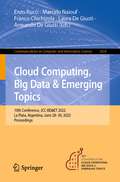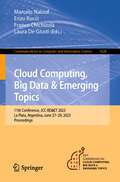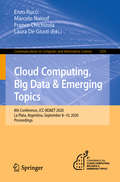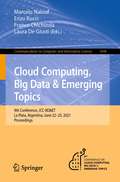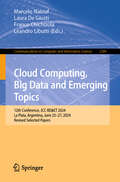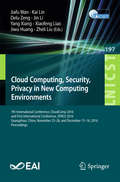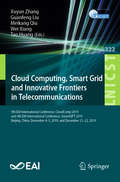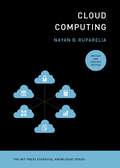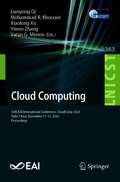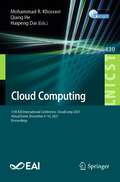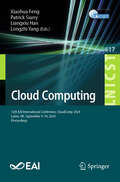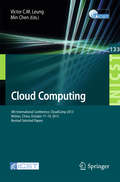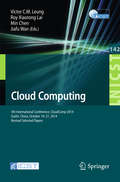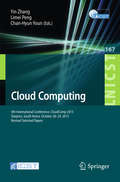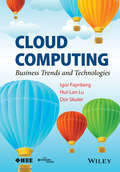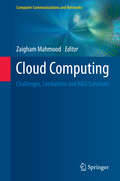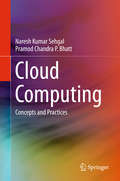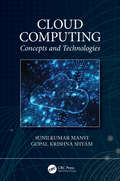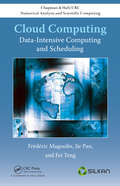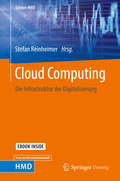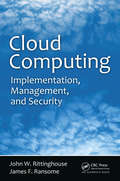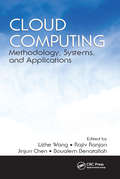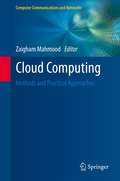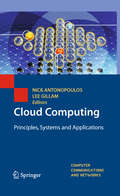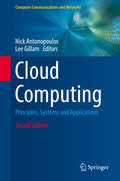- Table View
- List View
Cloud Computing, Big Data & Emerging Topics: 10th Conference, JCC-BD&ET 2022, La Plata, Argentina, June 28–30, 2022, Proceedings (Communications in Computer and Information Science #1634)
by Marcelo Naiouf Franco Chichizola Enzo Rucci Laura De Giusti Armando De GiustiThis book constitutes the revised selected papers of the 10th International Conference on Cloud Computing, Big Data & Emerging Topics, JCC-BD&ET 2022, held in La Plata, Argentina*, in June-July 2022.The 9 full papers were carefully reviewed and selected from a total of 23 submissions. The papers are organized in topical sections on: Parallel and Distributed Computing; Machine and Deep Learning; Cloud and High-Performance Computing, Machine and Deep Learning, and Virtual Reality.
Cloud Computing, Big Data & Emerging Topics: 11th Conference, JCC-BD&ET 2023, La Plata, Argentina, June 27–29, 2023, Proceedings (Communications in Computer and Information Science #1828)
by Marcelo Naiouf Franco Chichizola Enzo Rucci Laura De GiustiThis book constitutes the revised selected papers of the 11th International Conference on Cloud Computing, Big Data & Emerging Topics, JCC-BD&ET 2023, held in La Plata, Argentina*, in June 2023.The 14 full papers were carefully reviewed and selected from a total of 38 submissions. The papers are organized in topical sections on: Parallel and Distributed Computing, Big Data, Machine and Deep Learning, Smart Cities and E-Government, Visualization.
Cloud Computing, Big Data & Emerging Topics: 8th Conference, JCC-BD&ET 2020, La Plata, Argentina, September 8-10, 2020, Proceedings (Communications in Computer and Information Science #1291)
by Marcelo Naiouf Franco Chichizola Enzo Rucci Laura De GiustiThis book constitutes the revised selected papers of the 8th International Conference on Cloud Computing, Big Data & Emerging Topics, JCC-BD&ET 2020, held in La Plata, Argentina*, in September 2020.The 11 full papers presented were carefully reviewed and selected from a total of 36 submissions. The papers are organized in topical sections of cloud computing and HPC; Big Data and machine and deep learning.*The conference was held virtually due to the COVID-19 pandemic.
Cloud Computing, Big Data & Emerging Topics: 9th Conference, JCC-BD&ET, La Plata, Argentina, June 22-25, 2021, Proceedings (Communications in Computer and Information Science #1444)
by Marcelo Naiouf Franco Chichizola Enzo Rucci Laura De GiustiThis book constitutes the revised selected papers of the 9th International Conference on Cloud Computing, Big Data & Emerging Topics, JCC-BD&ET 2021, held in La Plata, Argentina*, in June 2021.The 12 full papers and 2 short papers presented were carefully reviewed and selected from a total of 37 submissions. The papers are organized in topical sections on parallel and distributed computing; machine and deep learning; big data; web and mobile computing; visualization..*The conference was held virtually due to the COVID-19 pandemic.
Cloud Computing, Big Data and Emerging Topics: 12th Conference, JCC-BD&ET 2024, La Plata, Argentina, June 25–27, 2024, Revised Selected Papers (Communications in Computer and Information Science #2189)
by Marcelo Naiouf Franco Chichizola Laura De Giusti Leandro LibuttiThis volume CCIS 2189 constitutes the refereed proceedings of the 12th Conference, JCC-BD&ET 2024, held in La Plata, Argentina during June 25–27, 2024. The 12 full papers presented were carefully reviewed and selected from 37 submissions. They were categorized under the topical sections as follows: Parallel and Distributed Computing, Machine and Deep Learning, Smart Cities and E-Government, Visualization, Emerging Topics, Innovation in Computer Science Education, Computer Security.
Cloud Computing, Security, Privacy in New Computing Environments: 7th International Conference, CloudComp 2016, and First International Conference, SPNCE 2016, Guangzhou, China, November 25–26, and December 15–16, 2016, Proceedings (Lecture Notes of the Institute for Computer Sciences, Social Informatics and Telecommunications Engineering #197)
by Jin Li Yang Xiang Jiafu Wan Kai Lin Delu Zeng Xiaofeng Liao Jiwu Huang Zheli LiuThis book constitutes the refereed proceedings of the 7th International Conference on Cloud Computing, Security, Privacy in New Computing Environments, CloudComp 2016, and the First EAI International Conference SPNCE 2016, both held in Guangzhou, China, in November and December 2016. The proceedings contain 10 full papers selected from 27 submissions and presented at CloudComp 2016 and 12 full papers selected from 69 submissions and presented at SPNCE 2016. CloudComp 2016 presents recent advances and experiences in clouds, cloud computing and related ecosystems and business support. SPNCE 2016 focuses on security and privacy aspects of new computing environments including mobile computing, big data, cloud computing and other large-scale environments.
Cloud Computing, Smart Grid and Innovative Frontiers in Telecommunications: 9th EAI International Conference, CloudComp 2019, and 4th EAI International Conference, SmartGIFT 2019, Beijing, China, December 4-5, 2019, and December 21-22, 2019 (Lecture Notes of the Institute for Computer Sciences, Social Informatics and Telecommunications Engineering #322)
by Wei Xiang Guanfeng Liu Meikang Qiu Tao Huang Xuyun ZhangThis book constitutes the refereed proceedings of the 9thInternational Conference on Cloud Computing, CloudComp 2019, and the 4th International Conference on Smart Grid and Innovative Frontiers in Telecommunications, SmartGIFT 2019, both held in Beijing, China, in December 2019. The55 full papers of both conferences were selected from 113 submissions. CloudComp 2019 presents recent advances and experiences in clouds, cloud computing and related ecosystems and business support. The papers are grouped thematically in tracks on cloud architecture and scheduling; cloud-based data analytics; cloud applications; and cloud security and privacy. SmartGIFT 2019 focus on all aspects of smart grids and telecommunications, broadly understood as the renewable generation and distributed energy resources integration, computational intelligence applications, information and communication technologies.
Cloud Computing, revised and updated edition (The MIT Press Essential Knowledge series)
by Nayan B. RupareliaAn updated, revised, and comprehensive overview of the concepts related to cloud computing, including recent applications, innovations, and its future evolution.In this Essential Knowledge volume, Nayan B. Ruparelia provides an updated and revised version of Cloud Computing, first published in 2016, to address not only the fact that cloud computing has become a ubiquitous part of mainstream computing since then but also has made strides in other key aspects of the technology&’s development, including:cloud computing&’s history,updated security fundamentals that provide examples of Identity and Access Management (IAM) use that illustrate the difference between on-premise (i.e., conventional) security and cloud-based security implementation and Security Information and Event Management SIEM),an updated discussion of data migration to the cloud,a new chapter on data integrity,cloud native computing,the use of microservice design patterns,cloud automation using orchestrators and tools such as Kubernetes,a comparison of common public clouds (Microsoft Azure, Google Cloud Platform, and Amazon AWS),and a future outlook for cloud computing.An indispensable guide to cloud computing for the layperson, Cloud Computing cuts through the technical jargon and details that are irrelevant to nontechnologists, as well as the marketing hype, and explains clearly what cloud computing is, when to use it (and when not to), how to select a cloud service, how to integrate it with other technologies, and what the best practices are for its adoption.
Cloud Computing: 10th EAI International Conference, CloudComp 2020, Qufu, China, December 11-12, 2020, Proceedings (Lecture Notes of the Institute for Computer Sciences, Social Informatics and Telecommunications Engineering #363)
by Lianyong Qi Mohammad R. Khosravi Xiaolong Xu Yiwen Zhang Varun G. MenonThis book constitutes the refereed proceedings of the 10th International Conference on Cloud Computing, CloudComp 2020, held in Qufu, China, in December 2020. Due to COVID-19 pandemic the conference conference was held virtually.The 14 full papers were carefully reviewed and selected from 49 submissions. The book is organized in four general areas of cyber-physical intelligent computing, secure cloud systems and cloud-based privacy, cloud-based IoT architecture, and cloud cCmputing applications.
Cloud Computing: 11th EAI International Conference, CloudComp 2021, Virtual Event, December 9–10, 2021, Proceedings (Lecture Notes of the Institute for Computer Sciences, Social Informatics and Telecommunications Engineering #430)
by Qiang He Mohammad R. Khosravi Haipeng DaiThis book constitutes the refereed proceedings of the 11th International Conference on Cloud Computing, CloudComp 2021, held in December 2021. Due to COVID-19 pandemic the conference was held virtually. The 17 full papers were carefully reviewed and selected from 40 submissions and detail cloud computing technologies for efficient and intelligent computing in secure and smart environments with distributed devices. The theme of CloudComp 2021 was “Cloud Computing for Secure and Smart Applications”. The book is organized in three general areas of data analytics for cloud systems with distributed applications, cloud architecture and challenges in real-world use, and security in cloud/edge platforms.
Cloud Computing: 12th EAI International Conference, CloudComp 2024, Luton, UK, September 9–10, 2024, Proceedings (Lecture Notes of the Institute for Computer Sciences, Social Informatics and Telecommunications Engineering #617)
by Patrick Siarry Longzhi Yang Xiaohua Feng Liangxiu HanThis book LNICST 617 constitutes the refereed proceedings of the 12th EAI International Conference on Cloud Computing, CloudComp 2024, held in Luton, UK, during September 9–10, 2024. The 16 full papers were carefully reviewed and selected from 42 submissions. The proceedings focus on topics such as The Cloud-Edging Computing Wireless Networks; Network Security Emerging Applications /The Cloud-Edging Integration Applications
Cloud Computing: 4th International Conference, CloudComp 2013, Wuhan, China, October 17-19, 2013, Revised Selected Papers (Lecture Notes of the Institute for Computer Sciences, Social Informatics and Telecommunications Engineering #133)
by Victor C.M. Leung and Min ChenThis book constitutes the thoroughly refereed post conference proceedings of the 4th International Conference on Cloud Computing, Cloud Comp 2013, held in Wuhan, China, in October 2013. The 28 revised full papers were carefully reviewed and selected from numerous submissions and cover topics such as mobile cloud computing, services, applications, IoT on cloud, architectures and big data, cloud-assisted pervasive computing and services, management and virtualization for cloud, cloud security.
Cloud Computing: 5th International Conference, CloudComp 2014, Guilin, China, October 19-21, 2014, Revised Selected Papers (Lecture Notes of the Institute for Computer Sciences, Social Informatics and Telecommunications Engineering #142)
by Min Chen Victor C.M. Leung Roy Xiaorong Lai Jiafu WanThis book constitutes the thoroughly refereed post conference proceedings of the 5th International Conference on Cloud Computing, CloudComp 2014, held in Guilin, China, in October 2014. The 25 revised full papers were carefully reviewed and selected from 72 submissions and cover topics such as mobile cloud computing, services, applications, IoT on cloud, architectures and big data, cloud-assisted pervasive computing and services, management and virtualization for cloud, cloud security.
Cloud Computing: 6th International Conference, CloudComp 2015, Daejeon, South Korea, October 28-29, 2015, Revised Selected Papers (Lecture Notes of the Institute for Computer Sciences, Social Informatics and Telecommunications Engineering #167)
by Yin Zhang Limei Peng Chan-Hyun YounThis book constitutes the proceedings of the 6th International Conference on Cloud Computing, CloudComp 2015, held in Daejeon, South Korea, in October 2015. The 36 revised full papers were carefully reviewed and selected from 89 submissions and cover topics such as virtualization and management on cloud; resource management, models and performance; mobile cloud and media services; pervasive cloud applications, services and testbeds; cloud-enabling techniques and devices.
Cloud Computing: Business Trends and Technologies
by Igor Faynberg Hui-Lan Lu Dor SkulerCloud Computing: Business Trends and Technologies provides a broad introduction to Cloud computing technologies and their applications to IT and telecommunications businesses (i.e., the network function virtualization, NFV). To this end, the book is expected to serve as a textbook in a graduate course on Cloud computing.The book examines the business cases and then concentrates on the technologies necessary for supporting them. In the process, the book addresses the principles of – as well as the known problems with – the underlying technologies, such as virtualization, data communications, network and operations management, security and identity management. It introduces, through open-source case studies (based on OpenStack), an extensive illustration of lifecycle management.The book also looks at the existing and emerging standards, demonstrating their respective relation to each topic.Overall, this is an authoritative textbook on this emerging and still-developing discipline, which•Guides the reader through basic concepts, to current practices, to state-of-the-art applications.•Considers technical standards bodies involved in Cloud computing standardization.•Is written by innovation experts in operating systems and data communications, each with over 20 years’ experience in business, research, and teaching.
Cloud Computing: Challenges, Limitations and R&D Solutions (Computer Communications and Networks)
by Zaigham MahmoodThis book reviews the challenging issues that present barriers to greater implementation of the cloud computing paradigm, together with the latest research into developing potential solutions. Topics and features: presents a focus on the most important issues and limitations of cloud computing, covering cloud security and architecture, QoS and SLAs; discusses a methodology for cloud security management, and proposes a framework for secure data storage and identity management in the cloud; introduces a simulation tool for energy-aware cloud environments, and an efficient congestion control system for data center networks; examines the issues of energy-aware VM consolidation in the IaaS provision, and software-defined networking for cloud related applications; reviews current trends and suggests future developments in virtualization, cloud security, QoS data warehouses, cloud federation approaches, and DBaaS provision; predicts how the next generation of utility computing infrastructures will be designed.
Cloud Computing: Concepts And Practices
by Naresh Kumar Sehgal Pramod Chandra P. BhattThis book provides readers with an overview of Cloud Computing, starting with historical background on mainframe computers and early networking protocols, leading to current concerns such as hardware and systems security, performance, emerging areas of IoT, Edge Computing etc. Readers will benefit from the in-depth discussion of cloud computing usage and the underlying architecture, with focus on best practices for using a dynamic cloud infrastructure, cloud operations management and cloud security. The authors explain carefully the “why’s and how’s” of Cloud Computing, so engineers will find this book and invaluable introduction to the topic.
Cloud Computing: Concepts and Technologies
by Sunilkumar Manvi Gopal ShyamComprehensive and timely, Cloud Computing: Concepts and Technologies offers a thorough and detailed description of cloud computing concepts, architectures, and technologies, along with guidance on the best ways to understand and implement them. It covers the multi-core architectures, distributed and parallel computing models, virtualization, cloud developments, workload and Service-Level-Agreements (SLA) in cloud, workload management. Further, resource management issues in cloud with regard to resource provisioning, resource allocation, resource mapping and resource adaptation, ethical, non-ethical and security issues in cloud are followed by discussion of open challenges and future directions. This book gives students a comprehensive overview of the latest technologies and guidance on cloud computing, and is ideal for those studying the subject in specific modules or advanced courses. It is designed in twelve chapters followed by laboratory setups and experiments. Each chapter has multiple choice questions with answers, as well as review questions and critical thinking questions. The chapters are practically-focused, meaning that the information will also be relevant and useful for professionals wanting an overview of the topic.
Cloud Computing: Data-Intensive Computing and Scheduling
by Frederic Magoules Jie Pan Fei TengAs more and more data is generated at a faster-than-ever rate, processing large volumes of data is becoming a challenge for data analysis software. Addressing performance issues, Cloud Computing: Data-Intensive Computing and Scheduling explores the evolution of classical techniques and describes completely new methods and innovative algorithms. The
Cloud Computing: Die Infrastruktur Der Digitalisierung (Edition HMD)
by Stefan ReinheimerDas Herausgeberwerk zeigt Chancen und Risiken des Cloud Computings auf, bringt Lesern das Thema durch anschauliche Beispiele aus Forschung und Praxis näher und zeigt die Implikationen auf, die aus dieser neuen Infrastruktur resultieren. Die Beitragsautoren präsentieren technische Lösungen, Geschäftsmodelle und Visionen, die einerseits die Herausforderungen und Hürden des Cloud Computing aufgreifen – technisch, rechtlich, prozessbezogen – und andererseits die Chancen und Nutzen dieses Architekturansatzes in den Mittelpunkt stellen. Es ist zeitgemäß, IT-Infrastrukturen, Daten und Applikationen aus der lokalen Umgebung in eine Cloud auszulagern. Der Anwender kann sich der angebotenen IT-Dienstleistungen unter Nutzung von Self-Service-Ansätzen bedienen, in Abhängigkeit davon, was und wieviel er gerade benötigt – und auch nur dafür wird gezahlt. Bereitgestellt, gewartet und aktualisiert werden die IT-Ressourcen zentral. Je nach Art der IT-Dienstleistung, die über die Cloud bereitgestellt werden, unterscheidet man zwischen IaaS – Infrastructure as a Service, PaaS – Platform as a Service und SaaS – Software as a Service. Der Sicherheitsbedarf und die Leistungsfähigkeit der Unternehmens-IT entscheiden darüber, ob man diesen Zentralisierungsansatz unternehmensintern in einer Private Cloud oder unternehmensextern in einer Public Cloud umsetzt. Sogenannte Hybrid Clouds sind ein Mittelweg, der sich immer stärker etabliert. Das Buch richtet sich an alle, die sich umfassend und praxisnah zum Thema Cloud Computing informieren möchten und die nach einer modernen Infrastruktur für die Umsetzung von Digitalisierungsansätzen suchen.
Cloud Computing: Implementation, Management, and Security
by John W. Rittinghouse James F. RansomeCloud Computing: Implementation, Management, and Security provides an understanding of what cloud computing really means, explores how disruptive it may become in the future, and examines its advantages and disadvantages. It gives business executives the knowledge necessary to make informed, educated decisions regarding cloud initiatives.The authors first discuss the evolution of computing from a historical perspective, focusing primarily on advances that led to the development of cloud computing. They then survey some of the critical components that are necessary to make the cloud computing paradigm feasible. They also present various standards based on the use and implementation issues surrounding cloud computing and describe the infrastructure management that is maintained by cloud computing service providers. After addressing significant legal and philosophical issues, the book concludes with a hard look at successful cloud computing vendors.Helping to overcome the lack of understanding currently preventing even faster adoption of cloud computing, this book arms readers with guidance essential to make smart, strategic decisions on cloud initiatives.
Cloud Computing: Methodology, Systems, and Applications (Computing And Networks Ser.)
by Lizhe Wang, Rajiv Ranjan, Jinjun Chen and Boualem BenatallahCloud computing has created a shift from the use of physical hardware and locally managed software-enabled platforms to that of virtualized cloud-hosted services. Cloud assembles large networks of virtual services, including hardware (CPU, storage, and network) and software resources (databases, message queuing systems, monitoring systems, and load-balancers). As Cloud continues to revolutionize applications in academia, industry, government, and many other fields, the transition to this efficient and flexible platform presents serious challenges at both theoretical and practical levels—ones that will often require new approaches and practices in all areas. Comprehensive and timely, Cloud Computing: Methodology, Systems, and Applications summarizes progress in state-of-the-art research and offers step-by-step instruction on how to implement it. Summarizes Cloud Developments, Identifies Research Challenges, and Outlines Future Directions Ideal for a broad audience that includes researchers, engineers, IT professionals, and graduate students, this book is designed in three sections: Fundamentals of Cloud Computing: Concept, Methodology, and Overview Cloud Computing Functionalities and Provisioning Case Studies, Applications, and Future Directions It addresses the obvious technical aspects of using Cloud but goes beyond, exploring the cultural/social and regulatory/legal challenges that are quickly coming to the forefront of discussion. Properly applied as part of an overall IT strategy, Cloud can help small and medium business enterprises (SMEs) and governments in optimizing expenditure on application-hosting infrastructure. This material outlines a strategy for using Cloud to exploit opportunities in areas including, but not limited to, government, research, business, high-performance computing, web hosting, social networking, and multimedia. With contributions from a host of internationally recognized researchers, this reference delves into everything from necessary changes in users’ initial mindset to actual physical requirements for the successful integration of Cloud into existing in-house infrastructure. Using case studies throughout to reinforce concepts, this book also addresses recent advances and future directions in methodologies, taxonomies, IaaS/SaaS, data management and processing, programming models, and applications.
Cloud Computing: Methods and Practical Approaches (Computer Communications and Networks)
by Zaigham MahmoodThis book presents both state-of-the-art research developments and practical guidance on approaches, technologies and frameworks for the emerging cloud paradigm. Topics and features: presents the state of the art in cloud technologies, infrastructures, and service delivery and deployment models; discusses relevant theoretical frameworks, practical approaches and suggested methodologies; offers guidance and best practices for the development of cloud-based services and infrastructures, and examines management aspects of cloud computing; reviews consumer perspectives on mobile cloud computing and cloud-based enterprise resource planning; explores software performance testing, open-source cloudware support, and assessment methodologies for modernization, migration and pre-migration; describes emerging new methodologies relevant to the cloud paradigm, and provides suggestions for future developments and research directions.
Cloud Computing: Principles, Systems and Applications (Computer Communications and Networks)
by Lee Gillam Nikos AntonopoulosCloud computing continues to emerge as a subject of substantial industrial and academic interest. Although the meaning and scope of "cloud computing" continues to be debated, the current notion of clouds blurs the distinctions between grid services, web services, and data centers, among other areas. Clouds also bring considerations of lowering the cost for relatively bursty applications to the fore. Cloud Computing: Principles, Systems and Applications is an essential reference/guide that provides thorough and timely examination of the services, interfaces and types of applications that can be executed on cloud-based systems. The book identifies and highlights state-of-the-art techniques and methods for designing cloud systems, presents mechanisms and schemes for linking clouds to economic activities, and offers balanced coverage of all related technologies that collectively contribute towards the realization of cloud computing. With an emphasis on the conceptual and systemic links between cloud computing and other distributed computing approaches, this text also addresses the practical importance of efficiency, scalability, robustness and security as the four cornerstones of quality of service. Topics and features: explores the relationship of cloud computing to other distributed computing paradigms, namely peer-to-peer, grids, high performance computing and web services; presents the principles, techniques, protocols and algorithms that can be adapted from other distributed computing paradigms to the development of successful clouds; includes a Foreword by Professor Mark Baker of the University of Reading, UK; examines current cloud-practical applications and highlights early deployment experiences; elaborates the economic schemes needed for clouds to become viable business models. This book will serve as a comprehensive reference for researchers and students engaged in cloud computing. Professional system architects, technical managers, and IT consultants will also find this unique text a practical guide to the application and delivery of commercial cloud services. Prof. Nick Antonopoulos is Head of the School of Computing, University of Derby, UK. Dr. Lee Gillam is a Lecturer in the Department of Computing at the University of Surrey, UK.
Cloud Computing: Principles, Systems and Applications (Computer Communications and Networks)
by Lee Gillam Nick AntonopoulosCloud computing continues to emerge as a subject of substantial industrial and academic interest. Although the meaning and scope of "cloud computing" continues to be debated, the current notion of clouds blurs the distinctions between grid services, web services, and data centers, among other areas. Clouds also bring considerations of lowering the cost for relatively bursty applications to the fore. Cloud Computing: Principles, Systems and Applications is an essential reference/guide that provides thorough and timely examination of the services, interfaces and types of applications that can be executed on cloud-based systems. The book identifies and highlights state-of-the-art techniques and methods for designing cloud systems, presents mechanisms and schemes for linking clouds to economic activities, and offers balanced coverage of all related technologies that collectively contribute towards the realization of cloud computing. With an emphasis on the conceptual and systemic links between cloud computing and other distributed computing approaches, this text also addresses the practical importance of efficiency, scalability, robustness and security as the four cornerstones of quality of service. Topics and features: explores the relationship of cloud computing to other distributed computing paradigms, namely peer-to-peer, grids, high performance computing and web services; presents the principles, techniques, protocols and algorithms that can be adapted from other distributed computing paradigms to the development of successful clouds; includes a Foreword by Professor Mark Baker of the University of Reading, UK; examines current cloud-practical applications and highlights early deployment experiences; elaborates the economic schemes needed for clouds to become viable business models. This book will serve as a comprehensive reference for researchers and students engaged in cloud computing. Professional system architects, technical managers, and IT consultants will also find this unique text a practical guide to the application and delivery of commercial cloud services. Prof. Nick Antonopoulos is Head of the School of Computing, University of Derby, UK. Dr. Lee Gillam is a Lecturer in the Department of Computing at the University of Surrey, UK.
